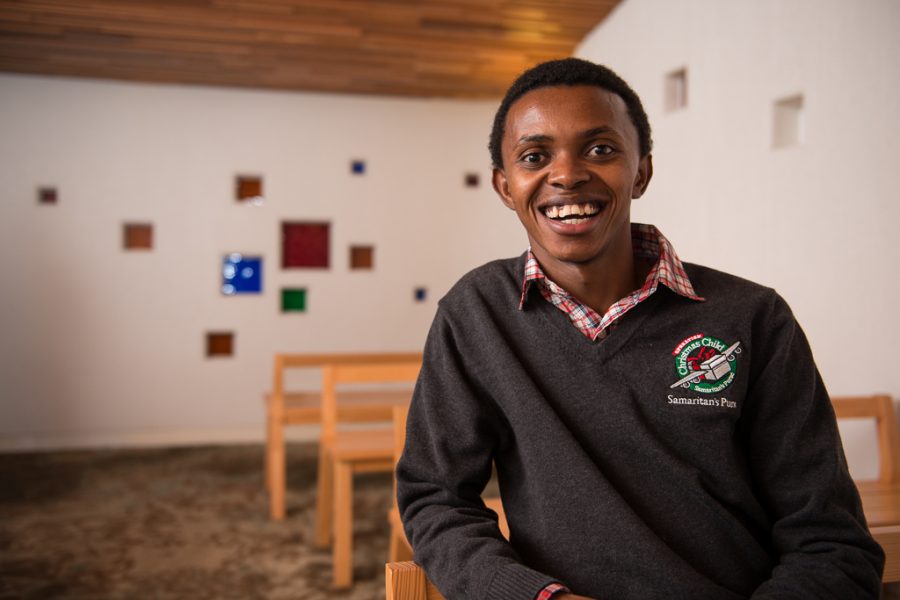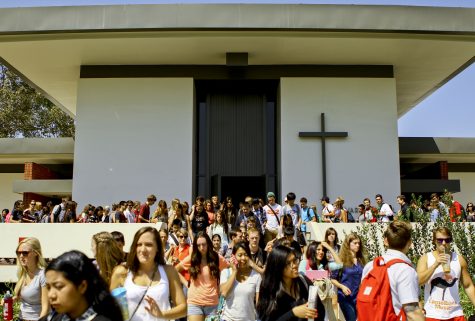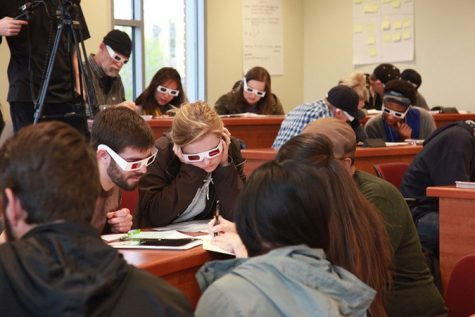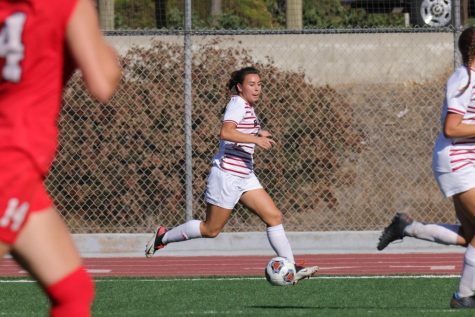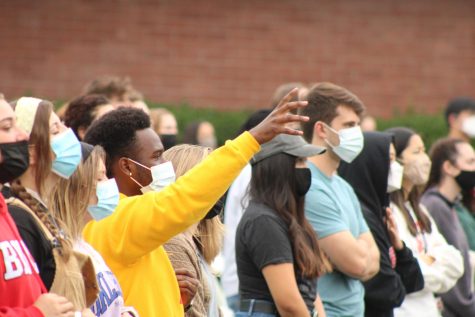Native Rwandan tells story of hope at shoebox packing party
Alex Nsengimana shared his testimony at the Operation Christmas Child packing party Tuesday night.
Alex Nsengimana, a Rwandan native, shared his testimony at the Operation Christmas Child packing party that took place in Sutherland Auditorium on November 12. | Olivia Blinn/THE CHIMES
November 14, 2013

As a young boy of only four, Alex Nsengimana, a native Rwandan, lost his mother to HIV. Without a father present, he and his brother and sister were taken in by his grandmother. She raised the three siblings and grew close with Nsengimana. Two years later, however, he and his two siblings helplessly watched while their grandmother was murdered. Nsengimana survived to tell his story to the world — one of loss, forgiveness and Jesus. Now he has joined Samaritan’s Purse to spread joy and hope through shoeboxes.
Operation Christmas Child arrives at Biola
Nsengimana shared his testimony during the packing party for Operation Christmas Child, a project for Samaritan’s Purse, in Sutherland Hall Tuesday Nov. 12. Afterward, students assembled boxes, filling them with toys and necessities for children across the globe.
“When I share my story I don’t want them to think that this is about me — because what God did in my life he is still doing and can do in their own lives,” Nsengimana said.
After the kids receive a box, whoever is in charge of distributing them follows up with a discipleship program, where the kids are taught about Jesus and given opportunities to receive him in their lives. They even challenge children to go farther and tell their friends and family about Jesus.
Nsengimana can personally testify to the impact Operation Christmas Child has on children.
Genocide in Rwanda
In early 1994 a massive genocide took place in the African state of Rwanda. Rwanda was colonized by the Belgians, causing division and hatred between the two warring tribes, the Hutu peoples and the Tutsi population. The Hutus were the majority group in Rwanda. When the president was assassinated on Apr. 6, they took it as an open invitation to start a killing rampage against the Tutsi tribe.
According to the United Human Rights Council, 800,000 people perished in the violence — both the Tutsi tribe members and Hutu peoples who opposed their tribe extremists. Many of Nsengimana’s family members and friends were brutally murdered as part of the 800,000.
Nsengimana and his siblings narrowly escaped death multiple times during the violence. After their grandmother and uncle were killed, Nsengimana and his brother and sister ran to the nearby city where his aunt lived. With the water supply destroyed, the quality of living was poor. The city lived in constant fear as they woke up nightly to bombs exploding.
“In the night, you [had] to be alert. You [couldn’t] really sleep comfortably,” Nsengimana said.
On the Run
City life got to be too unbearable. Not knowing if they would live to see the next day, Nsengimana and his family packed up their belongings to run for about two months. Not having an intended destination, they searched for something safer than their present situation.
“Wherever the night would find us, that’s where we would sleep,” Nsengimana stated.
While on the run, they were caught in the middle of battling Tutsi refugees, who came to stop the genocide, and the militias of the Hutu tribe. They found themselves being shot at from all sides. During one close call, six-year-old Nsengimana could not keep up. Slipping on a cow pie while running, he recalled hearing a bullet whiz past his head.
“I always like to say how humorous God is, that he used that pie to save my life,” Nsengimana said.
The Orphanage
Not knowing where else to go, the three returned home to their aunt, who had since fallen ill. She put Nsengimana and his brother in the orphanage across the street — his sister was too old to go. Three months later, his aunt passed away.
Nsengimana felt lost among the 250 other children in the orphanage.
Hope in Jesus
Samaritan's Purse, an evangelical Christian organization, soon visited the orphanage providing medicine and cleaning up all that the war had destroyed. The humanitarian organization also handed out shoe boxes to the kids filled with toys, candy, clothes and hygiene products. When Nsengimana opened his present, he said that a seed of hope was planted in him. He understood that there must be someone out there who loved and cared for him.
Through the African Children’s Choir, eight-year-old Nsengimana travelled to Uganda in order to learn English and later come to the United States, intending to raise money to build schools in East Africa.
While in Uganda, Nsengimana questioned why his life was spared when so many others’ weren't. If there was a God who cared for his people, how could he let the genocide happen?
As he was studying his Bible, Nsengimana came across the verse Jeremiah 29:11. Even though he had no context for the verse, God spoke through his word and Nsengimana put his faith in Jesus that day.
“At that time, that answered my prayer because I knew there’s got to be a reason I’m alive today, and what is that purpose, what is that reason, so I can follow it,” Nsengimana said.
He looked back at all of the close calls and coincidences of his past and realized they were not coincidences after all — they were miracles from God.
Forgiveness
In 2003 Nsengimana came back to the U.S. to get an education. In high school he became involved with Operation Christmas Child. He continued to pack boxes and attend packing parties while attending Crossroads College in Minnesota.
Even as a Christian, Nsengimana found it hard to let go of his bitter anger for the people who killed his family. Throughout high school and college in the U.S., he prayed that God would help him forgive his family's murderers because he knew he could never be at peace if he continued hating them.
However, in March of 2013 Nsengimana went to Rwanda with Operation Christmas Child to hand out shoe boxes to the children at the same orphanage he lived in when he was little.
“It was quite a moment I will never forget,” Nsengimana said.
During that visit he searched for the men who killed his family. He visited the town’s prison and found his uncle’s murderer behind bars.
“I had been praying that prayer ever since I came to know [God] and understanding [his] love, and I wanted to share that love with him — with the guy who killed my uncle,” Nsengimana said.
Since witnessing the many deaths around him and storing a bitter hatred for the murderers, Nsengimana has come a long way — from Rwanda to the U.S., from an orphanage to Samaritan’s Purse, and from bitterness to forgiveness.


